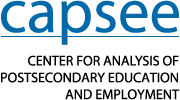Early Labor Market and Debt Outcomes for Bachelor’s Degree Recipients: Heterogeneity by Institution Type and Major, and Trends Over Time
By: Judith Scott-Clayton | July 2016
While research has consistently found strong positive earnings returns to the bachelor’s degree, recent evidence also highlights heterogeneity in post-college outcomes. Combined with increases in the proportions of students borrowing to enroll, heterogeneity in college outcomes introduces the risk that some students with college degrees may experience financial hardship after graduation.
Using nationally representative data on baccalaureate recipients in 1993 and 2008, this paper jointly examines labor market and debt outcomes four years after students graduate, with a focus on exploring heterogeneity by institution type and major field of study, as well as trends over time. Results confirm that the typical graduate fares well after college, both in terms of earnings and debt management. Borrowing rates and debt loads have increased substantially over time, but these substantially higher levels of debt are nonetheless manageable for the vast majority of graduates. Within this context of positive outcomes, stratification by institution type, for both earnings and debt outcomes, appears to be increasing. Similarly, while the top-earning majors have remained quite stable over time, the magnitude of the advantage of engineering, math/computer science, and business graduates has grown notably. Examining debt alongside earnings only reinforces the patterns by major: higher earning fields also have lower debt-to-earnings ratios.
Overall, these patterns offer reassurance regarding the typical returns to bachelors’ degrees, even for those graduating into the Great Recession, and even in light of growing debt loads. But the results also provide evidence that students’ choices about where to attend and what to study have only become more consequential over time.
